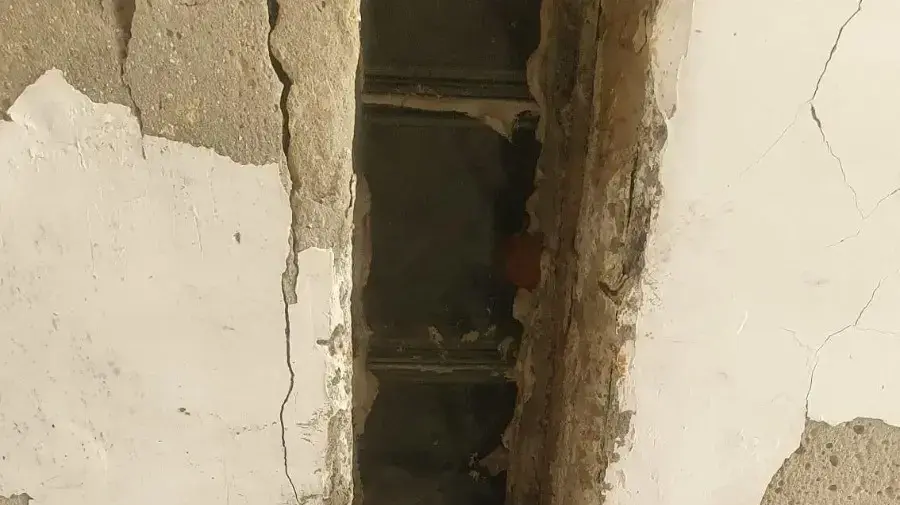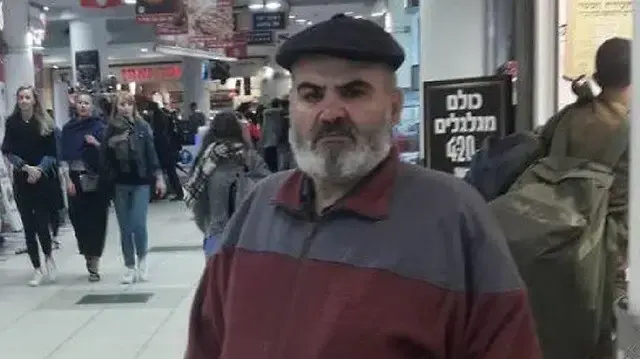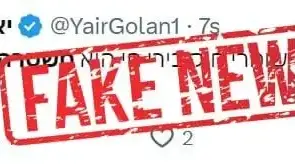His voice may be one of the best known in Israel, but when Yoram Arbel sits for fun in a cafe in central Tel Aviv, without glasses and 22 players running after a ball in front of him - he does not look like the mythical sports broadcaster who broadcast thousands of games, conceived "That's not how you build a wall! "
And brought into our lives the "L-l-lu-ya!".
"Currency is something that happens to you once in your career, maybe twice," he smiles, "and it also takes a lot of luck for those two times to happen. It's something that comes from the belly, you can not plan it, you can not build it, you can not think 'when "I'll say that. '
Arbel gets upset again, recounting in his head the same stupid goal that the Israeli team suffered from the Australian team in March 1989, as part of the 1990 World Cup qualifiers. " ".
It has broadcast thousands of sports broadcasts, in all possible settings, and in all industries: football, basketball, European Cup, Euroleague, Champions League, World Cups (from 1978 to 2002, and again in 2014), Euro (1984, 1988, 2012, 2021), Olympics (Los Angeles, Seoul, London) - You Name It.
Arbel was there before everyone else, before the VAR and before the Corona sabotaged sporting events just because it could.
He was also the first to report the shootings in Rabin Square, then Kings of Israel Square, on November 4, 1995. At the same time, he broadcast on Channel 2 the league's summary program, "The 91st Minute," from Teled Studios in Jerusalem.
The broadcast was interrupted by a chilling announcement in his quiet voice: "About half an hour ago, at the end of the rally in the Kings of Israel Square in Tel Aviv, there was an attempt to hit Prime Minister Yitzhak Rabin. Three shots were fired at him, three shots were fired. The Ichilov patients in Tel Aviv, our condition is not known to us at this stage. "
"I read the post twice," he recalls.
"It was not yet clear how Rabin was doing, it only became clear later. Within minutes, the news broadcast from the square was organized, and we finished our broadcast."
• • •
In the new Premier League football season, 79-year-old Arbel is seen and heard broadcasting games on Charlton's sports channels and also on ONE, a site he helped set up (in its former name, "91st Minute"), where it broadcasts the Spanish league.
Do you have an influence on which games you get to broadcast?
"Informal, but I think the person who arranges the work takes into account my status and my ability. If there is a possibility to put me in an important game, they will not put me in a mediocre game. It is true that sometimes other considerations come in, 'deserves it' and 'deserves it', "I have no problem with that. I have no problem broadcasting bottom games in the league as well."
How is the level of games in Israel today compared to before?
"We like nostalgia, we like to say that there used to be good football here, and today it is less good. That is not true. The game has changed. It is faster, more physical. It is true that it is less beautiful to the eye, because then they played more slowly, but the level goes up. "Not at the pace I would like."
What do you think about the violence in the stands and the behavior of the fans, compared to the 70s and 80s?
"There is a big improvement, the situation is encouraging. There is no doubt that since the audiences are separated and there are enough ushers, everything is better. I remember very difficult plays, not only here but all over the world."
When you broadcast a game of Bnei Sakhnin against Hapoel Hadera, does it still excite you?
"Yes, it excites me. I still arrive early on the pitch, to get into the atmosphere, but even during the time I broadcast a lot in Europe, people always asked me, and I also asked myself, 'How do you get from Camp Nou to the Hatikva neighborhood? How excited are you when Ehud Ben- Good gives a goal, like it was Maradona or Messi? '".
And what did you answer to yourself?
"30 years ago I was sent from the sports channel to broadcast a final game of girls' football, ages 13-12. I came to the field, and a girl from her room gave a goal - a waste of time, something between the connections. I shouted on the broadcast as if it were the World Cup minimum.
"When you manage to put yourself in a state of mental concentration, and forget everything else at the same time - then what you do is the important thing. In a live broadcast you get excited about beautiful things and get disappointed with less beautiful things, no matter what pitch it happens on, or who plays. Also the sign that it is a bacterium. "
"In my opinion, there are no older broadcasters in the world than me."
Interviewing Miki Berkovich in a Maccabi Rishon Lezion uniform in the early 1990s, Photo: Moshe Shai
Are you preparing for each broadcast?
"Certainly. There is not a single detail about a team or a player that does not appear to me. It is true that I do not often use it, because I broadcast more from the stomach and less broadcast of trivia, but I have everything. I come loaded with all the necessary materials."
There have been vicious reviews and talkbacks about you not recognizing players and getting confused a lot.
"Let me reassure them - I remember very well. There is no message that is not wrong, the question is how often it happens, and how critical it is. Because if the left defender now passes a delivery to someone, and you made a mistake in the player's name - you were wrong. It is not critical.
"I have had mistakes of negligence, of a dead moment, of loss of concentration - but it happens to everyone. Those who look for the mistakes, usually also will find. .It very much depends on your mental state.If you arrive unconcentrated or tired, you will be wrong.
"I don't think in the last five years I can put my finger on my critical mistake, before that there were also. At the 2014 World Cup in Brazil a player came in as a substitute, and I did not know who went up and who went down. Things like that. Today I do not think I am more wrong than other broadcasters." .
So the visitors were looking for you.
.
Newspaper reviews would you read?
"Yeah, and one of the amazing things is that sometimes I also took to my attention. Today there are almost no more reviews on broadcasts, get off of it."
• • •
How are you different from other broadcasters?
"One of the problems today, even when you hear news on the radio, and of course in football broadcasts, is that it is very difficult to identify who is broadcasting and say - this is the broadcast I like or dislike. Sometimes I sit at home and watch the game, and I do not know who is broadcasting.
"It did not happen in my time, not in the time of the late Meir (Einstein; 7) and it does not happen with Remy (Weitz). We have a certain presence, that you do like or dislike, but it exists. Voice is the basis .
Who are the best broadcasters today?
"I think Meir was an excellent transmitter, Rami is a good transmitter, Amichai Spiegler is evolving to be a good transmitter. The question is what imprint are they leaving. The younger generation are professionals, especially Spiegler, who grew up in football. He brings with him values, mind and heart, and heart. "In these broadcasts he is a very important factor. He lives it from home, and he breathes football. That's why I think from the younger generation, he stands out in my eyes."
"What stands out to me."
Amichai Spiegler, Photo: From YouTube
You did not specify yourself.
"I will be judged by others. I think I am a good, measured, fair broadcaster. I do not execute people on the broadcast. I like that they go, and less like that they do not go. It is important to me that they play well and do what I see as the goal of professional sports - entertainment. "It's entertainment. I do not own a team or a coach, for whom victory at all costs is the goal."
This is the American concept. Show.
"Right. That's why they were angry at me at the time, when I was broadcasting an Inter game in Barcelona. Mourinho coached Inter, and they came to the game to spoil it. I was angry about it on the broadcast, even though tactically, it was true, and Mourinho achieved his goal - he forced his game About Barcelona. "
Are you in touch with other messengers?
"There is no broadcaster who is my friend. I meet Remy in the corridors, there is 'Hello' and 'How was this and that broadcast', but we are not friends. My relationship with Liran Shechner is good. I do not meet Niv Raskin, so I have no contact with him .
The late Meir Einstein was the kind of rare bird that had many friends around him, but I was never in the immediate circle.
I did not get to work with him, he inherited me from the Broadcasting Authority and I joined Charlton after he passed away.
"Indeed, I do my best to help. If you ask me, I'm always willing to help and contribute a little bit from my experience, not that they like it that much. People like to learn the hard way, and everyone is looking for their own unique style. When I talk to young broadcasters, "I talk to them mainly about technique - understanding the mood of the broadcast, knowing when to speak and when not. You can't teach a person what to say or in what intonation. The technique is important, and the young guys don't quite understand it."
"A rare bird."
The late Meir Einstein, Photo: Pini Silok
What do you think about Gretel's dismissal from swimming at the Olympics?
"I did not get to talk to him. I read the interview with him in this supplement a month and a half ago, and I understood the things that came out of his heart. He has no heir in the meantime, you can not decide one day that you are a swimming broadcaster.
"Swimming is a difficult profession to broadcast, and Gretel knows swimming and living it. The one who has his ports, he has. He has a special personality, and some of his sentences have become cult, but still, he knows what's going on, he knows how to analyze the ointment. I think "That he is the type of broadcaster that needs to be broadcast until he can no longer. If they had discovered a new star in this field, it might have been understood, but there is no star."
Eli Ildis?
"Eli Ildis is an excellent presenter, but maybe he should have refused to broadcast the swim from Tokyo, or do what Miri Nevo did. Miri comes from sports, and she is diligent and learns everything she does, and that's what makes the difference. I think sending an inexperienced broadcaster It is to do injustice to him and the viewers.
"But I understand Eli, I also did not refuse when I was told to broadcast weightlifting. I did not understand anything about it, I just started to find the humorous side of it.
"Today there are no broadcasters like Nissim Kivati, who knew in his heart the profession he broadcasts, athletics. He did not sleep nights before broadcast, filled out notebooks, wrote and prepared, and came to broadcast when he knew. He knew much more within the profession than you would expect from a broadcaster. "Today - we need to prepare for this. In my guilt, I once broadcast an ointment at the Olympics, in 1988, as a replacement."
and how was it?
"Terrible. It was a mistake to do that."
"He knew in his heart the profession he was broadcasting. There are no broadcasters like him today."
With Nissim I Hoped, Photo: Moshe Shai
Do you feel a change in the role of the broadcaster today?
"The role changes a bit, but it goes in the direction I like - emotional broadcast. You actually take the viewer and tell him, 'Come sit next to me, we'll experience this together.' "What, tell him again that Messi gave a goal with his heel two years ago? It's less relevant. He wants you to excite him, so the broadcast becomes more emotional than technical, and that needs to be internalized."
Which commentators did you like to work with the most?
"I worked with Eyal Berkowitz for one year and enjoyed every moment. He's a big mouth, but he got into the role and did it excellently. To hear a player at this level, considered one of the ten best morals in English football, talk about a game - that's enlightenment. He was a great player, and he Knows how to appreciate a great move by an actor, and also a stupid move.
"Moti Ivanir is a commentator I discovered, in 1995, and since then we have been broadcasting together, with breaks. I really like working with him, because there are things between us that are beyond broadcasting conventions - timing, how much to talk, reaction to leveling up, humor. These are things you do not always do. Manages to produce with Partner.I work a lot both with Uri Ozen, who is also an excellent commentator, and also with Avi Nemani, who has no doubt about his knowledge of football.
"I am in favor of a commentator who comes from the field, a player or a coach. It is true that there is also a sports journalist who knows a lot, but commentary on the game, during the event, should be from someone who has experienced the experience and knows the feeling of sweat in the eyes. I believe that.
"At the 1990 World Cup in Italy he worked for a commentator on Italian television called Pele. Believe me, he did not say anything clever. I asked people to translate what he says to me, and people from Italian television also admitted it. But it's Pela.
"By the way, it's not that there are no opposite examples. Ofer Shelach is an excellent basketball commentator, who has never thrown a professional shot into the basket."
• • •
He was born in 1942, the second son of Shmuel (Mula) and Chaya.
At the age of 8, his world was destroyed when his older sister, Erela, who was 12, died in the United States after surgery to remove a benign tumor from her head.
"In those years, the 1950s, brain medicine in the country was almost non-existent," he says.
"Our friends in Petah Tikva collected money and sent it to Boston with my father. It was successfully operated on, but then they wanted to make a small repair, and someone there messed up, as far as I know. She died and was buried in Boston. My father, out of grief and grief, stayed another year In America. He did not want to look my mother in the eye. I once went to her grave in the United States, in the late 1970s.
Were you close?
"Yes. After her death I was left to be an only child, and the house became a mourning house. I did not want to be sad, so I was not such a good boy. I just stopped studying.
"In 1957, seven years after Erella's death, my father also died, unfortunately. It was a severe disaster. Losing a child is the hardest thing in the world. My mother died in 1983."
He grew up in the orchards of Petah Tikva, where his sympathy for the local Hapoel also developed.
"My life in sports starts with football in the neighborhood. I played in a children's team, and then in boys, but I switched to handball, because I discovered that my top is stronger and dominant than the bottom.
"From handball I switched to athletics. I would throw a javelin, I even won the Israeli youth championship and also the national championship for seniors one year, at the age of 16, and I was on the Israeli athletics team. I was always involved in sports.
“In 11th grade I was thrown out of school, and I did not come back.
I later completed my studies at External, but I do not have a matriculation certificate to this day.
I flourished elsewhere.
I started getting to know girls and going out to parties, to dancing.
I wanted to live. "
In 1959, he enlisted in the Nahal band, and served in a group of Polly and Gavri men from Gashashim. "Yehoram Gaon was our commander.
We were a serious band, but somehow I did not find my place in it. "
After the Army you released the mythological song "I'm Fingering the Throw in Green", and the first and last album in your life. Is poetry a missed career?
"Absolutely not. It was not for me."
For 46 years he has been married to Marit, the father of Jonathan and Anat, and the grandfather of Sofia, Adam, Yuval, Ariel and Lily.
He lives in Caesarea, which he moved to because of the golf courses.
"In recent years I play twice a week, and if I could, I would play every day. Most of my friends are from the golf course."
Do you have no friends from the world of sports?
"No. Producer Amnon Barkai is a good friend of mine, and so is producer Itzik Glicksberg."
What do you find in golf?
"It's a sophisticated and clever sport. You may not be running, but there is a lot of mental effort. It is the sport that is considered the most complicated and sophisticated in terms of its biomechanics. It is much easier to kick a ball or throw a ball into the basket , Given the pitch conditions, the wind, the distance from the hole.
"Your mental state in golf is dramatically skyrocketing. The ability to clear your mind of any thought and be a 'smooth board', free of thoughts. Sometimes it works and sometimes it doesn't. If the smallest thing distracts you, go for it."
"It's much easier to kick a ball or throw a ball to the basket."
Arbel at the golf course, Photo: Moshe Shai
• • •
Perhaps from the trauma of his childhood, Arbel also grew his composure and patience, thanks to which he eventually became a sports broadcaster.
"In our industry, when 'all positions are occupied', you wait your turn. And I waited many, many years until the opportunity arose. I tried radio, I was a radio man at the Voice of Israel ten years after my release from the army, and I did every possible job there - from new narrators, through Editing and submitting music programs, to reading the chapters of the day in the Bible.
"During the waiting period before the outbreak of the Six Day War, the Broadcasting Authority decided that only the old announcers, who sound the most authoritative and calm, would read the news on the radio. I read the six, seven and eight editions, I read the six and seven editions, and then, a few minutes before eight, there was an alarm in Jerusalem.
"I went into the studio building and talked on the phone, and a news editor came running with a sheet of paper, shoved it next to me and said, 'Come up and read this.' My blood froze in my veins. "And I announced the announcement. I announced the outbreak of the Six Day War."
But it was not sports that you did not broadcast on the radio.
"True, this was done by the late Nehemiah son of Abraham."
In the late 1960s he went to study television in New York.
"I studied directing and production, and I was sure I would return to Israel and appear here on television."
It did happen, thanks to a chance meeting with Dan Shilon, then director of the sports department at Young Israeli Television.
The year was 1972.
"He invited me for coffee at 'Cafe Exodus' in Tel Aviv, and asked if I would be interested in preparing sports articles for television. I immediately said 'yes'. On Saturday of that week I already went to Bloomfield. What is he doing, and a week after that I started doing articles for a sports look.
"Luckily, I came to television without first broadcasting sports on the radio, so I was exempt from the habit of describing what I see. On television you do not describe, you testify.
"Before my first football broadcast on television I was not ashamed, and sat for hours on videos of the great English broadcasters, which I saw as a model. For example, David Coleman, who was a legendary BBC broadcaster.
"The recording device in the sports department was inside a shelf cabinet with tin doors. The cabinet would be opened, and there was a recording device and a small monitor. There I watched them. With some of them I even got to work later, standing next to a stand.
"I learned basketball from the American broadcasters, especially from Merav Albert, a Jewish broadcaster who broadcast the NBA games for years."
His progress on television was rapid.
By 1974, he had begun to present a sports look in place of Alex Giladi.
"I submitted until 1976, then I went on sabbatical and went to New York. I had a dream of starting a jingle company there. I was there for almost a year. So I did other things. "
"Sports Look" soon became the anchor of television broadcasts, and Arbel became one of the big stars of the period.
He brought with him a deep and clear voice, a charismatic presence and excellent control of the sport.
At the same time, he continued to work in radio until the end of the 1970s.
"בחיים לא פילסתי את הדרך, למרות שלאורך הקריירה היו כל מיני השמצות שאני דורסני, במיוחד בתקופה שבה הייתי גם מפיק. אין לי מרפקים, וגם היום אני לא מרפקן. אם אתה מוכשר באמת, וגם קצת יוצא דופן, אאוטסטנדינג, אתה לא צריך מרפקים. אני יודע, גם היום, שאם הייתי באמת 'ממרפק', זה היה עוזר לי לקבל את השידור הזה או את השידור ההוא. זה פחות חשוב בעיניי היום".
מה היו חוויות השיא שלך כשדר?
"היו הרבה. למשל, גמר היורו ב־1988, הולנד נגד בריה"מ, עם הנבחרת הענקית של חוליט, קומאן, רייקארד ומרקו ואן־באסטן. היו כמובן גמרים של מונדיאל, שהם חוויה בפני עצמה. ב־1986 שידרתי את גמר המונדיאל במקסיקו - ארגנטינה של מראדונה, אחרי 'יד האלוהים', נגד מערב גרמניה. זה היה מונדיאל מדהים. מקסיקו היתה מוכת רעידת אדמה, הם היו מסכנים, ובאנו לשמח אותם.
"היו שיאים גם בשידורי האן.בי.אי, כי במשך שנים שידרנו את משחקי הפלייאוף מהמגרש. לשדר את מייקל ג'ורדן כשאתה יושב חמישה-שישה מטרים ממנו, לראות את תופעת הטבע הזאת, זה מטורף.
"שידרנו סדרה של שיקגו נגד פיניקס ואת יוסטון נגד הניקס, ושידרנו משחק אחד מהגארדן בניו יורק במסך חצוי - בצד אחד משחק, נדמה לי חמישי, ובצד השני מרדף מטורף אחרי או.ג'יי סימפסון.
"היו גם רגעי דרמה קשים. למשל, האסון באצטדיון הייזל בבריסל בשנת 1985, שבו נהרגו 39 אוהדים ונפצעו מאות, בגמר גביע אירופה לאלופות בין ליברפול ויובנטוס. זה היה שידור שאחריו היתה הרבה ביקורת עלי, בעיקר מצד אנשים שלא מבינים מה זו טלוויזיה ובאילו תנאים שדר טלוויזיה עובד".
תסביר.
"זה לא שלא הבנתי מה קורה, פשוט לא יכולתי לדעת מה קורה מהמקום שבו ישבתי. לא רק אני, אלא כל 40 השדרים שהיו שם, מכל העולם. היינו ממודרים בתוך אזור סגור, ולא יכולנו לדעת, כי האסון קרה מאחורינו. ידענו אחרי שעה, כשראינו שמובילים גופות. זו היתה טראומה קשה".
אילו רגעים זכורים לך במיוחד מהספורט הישראלי?
"אני זוכר היטב את משחק הליגה הראשון ששידרתי בשידור חי. זה היה ב־1986, הפועל ת"א נגד מכבי חיפה בבלומפילד, משחק האליפות של הפועל, שניצחה 1:0.
"היתה לי חוויה לשדר את עונת הדובדבנים של פיני גרשון כמאמן גליל עליון בשנים 1993-1992, שהסתיימה בכפר בלום, כשגליל עליון עם בראד ליף ודורון שפר שברה את ההגמוניה של מכבי ת"א וזכתה באליפות אחרי 23 אליפויות צהובות רצופות. זו היתה השנה הראשונה ששידרנו כדורסל בערוץ הספורט. סגרתי אז שייתנו לי את זכויות השידור בחינם, כי אף אחד לא רצה לשדר את הכדורסל הישראלי, כך שאני הייתי גם מפיק השידורים וגם השדר הראשי.
"שידרתי את גמר גביע אירופה לאלופות ב־1981, מכבי ת"א מול בולוניה, ביחד עם טל ברודי. זו היתה הזכייה השנייה של מכבי, ובסיום הקהל שטף אותנו והפיל אותנו, כך שאת הדקה שאחרי שריקת הסיום שידרנו חצי בשכיבה".
יש שידור שאתה מצטער עליו? משהו שהיית עושה אחרת?
"אין שידור שהייתי עושה אחרת, ממש לא. יש שידורים טובים ויש שידורים רעים, אבל להגיד לך שיכולתי לעשות אותו אחרת? לא. באותו רגע נתון, בתנאים הנתונים, לא הייתי יכול לעשות את זה אחרת".
• • •
ב־2014 ספג ארבל מכה מקצועית קשה, כשפוטר משלושה מקומות עבודה - רשות השידור, ערוץ הספורט וערוץ 10.
"בערוץ הראשון זה היה הכי מעליב. תמיד הזהירו אותי לא לחזור לשם, אבל התפתיתי. זה נעשה בשיחת טלפון ב־8:30 בבוקר. התקשר מנהל בכיר, יונה ויזנטל, ובמילים פשוטות הודיע שאני לא אשדר עוד את המשחק המרכזי. הוא היה קצר וקר. זה היה חודש אחרי המונדיאל.
"2014 היתה שנת מפנה בקריירה שלי. אני לא אוהב לדבר עליה הרבה, כי זו שנה שאני מנסה למחוק מהזיכרון. שנה שבה עשיתי את הדברים הכי גדולים בספורט ונפלתי את הנפילות הכי גדולות, חלקן גם באשמתי.
"נתחיל בזה שהיה לי תיאבון גדול מדי. לקחתי על עצמי יותר מדי - את גמר ליגת האלופות, את מכבי תל אביב בגביע אירופה בכדורסל, את המשחק המרכזי בליגת העל בערוץ הראשון, ובקיץ גם את המונדיאל בברזיל. זה היה 'אצבע בעין' להרבה מאוד אנשים.
"המונדיאל באמת היה קטסטרופה. זה לא היה בהכרח עניין של עומס, אלא שהרבה מאוד אנשים הרגישו כנראה רוויים ממני. וזו היתה טעות שלי, הייתי צריך לעצור. הייתי צריך להפסיק לשדר את המונדיאל אחרי שבוע, כבר בשלב הבתים. הרגשתי שעשיתי טעות שנסעתי, ידעתי שאני משדר לא טוב ורציתי לחזור הביתה. אבל לא יכולתי להרשות לעצמי לעלות על מטוס ולהגיד לרשות השידור 'ביי ביי', למרות שלא היתה לי שום התחייבות חוזית. ידעתי שזה יעשה להם בעיה קשה, כי אי אפשר היה להביא שדר במקומי".
הגעת למונדיאל לא מוכן?
"הגעתי מוכן, הנפילות היו בגלל התנאים הקשים. קשה מאוד לשדר בתנאים שבהם חייתי שם. גם מבחינת שינה, גם מבחינת טלטולים, גם מבחינת תזונה, גם מבחינת ההתכוננות לשידור בתנאים לא תנאים. נגיד, להגיע בבוקר לבתי מלון מסוג ג' ולחכות בלובי חמש שעות כדי להיכנס לחדר. הייתי מותש.
"ואחרי כל זה, נכון, היו טעויות בשידור. זו היתה נסיעה לא מקצועית, ואכלתי אותה עד הסוף. בלי לקרוא את הביקורות, ידעתי שלא אוהבים את מה שאני עושה. אגב, בשורה התחתונה, היו לי שם משחקים רעים, אבל היו גם טובים. את הגמר עשיתי מצוין".
בכל זאת, זה מעצבן אותך עד היום.
"זה מעצבן אותי, כי כעסתי על רשות השידור, כעסתי על עצמי, כעסתי על הברזילאים, על חוסר האונים שם, על הברדק, על זה שכל התכנון היה עקום. פרטאץ'".
מה היתה הפאדיחה הכי גדולה שלך בשידור?
"היו לי פאדיחות, קשה לי להיזכר באחת ספציפית. אין שדר שאין לו פאדיחות. אתה טועה לפעמים פה ושם. קראתי למישהו פעם מוטי איווניר ביציע, וזה לא היה הוא. יש לפעמים פיזור דעת בשידורים".
• • •
לא תראו את יורם ארבל בהשקות נוצצות או באירועים המוניים. אין לו פייסבוק ואין לו אינסטגרם, "כי לא בא לי להתכתב עם כל הסחלה שיש בעולם הדיגיטלי, זה לא חסר לי. אני קורא טוויטר, שם אני עוקב אחרי אנשים שחשוב לי לקרוא אותם. וגם שם אני לא מגיב.
"אנחנו משפחה שדי מתרחקת מהכותרות. חיים את חיינו בשלווה בקיסריה, יש לנו בית נחמד שאנחנו מאוד אוהבים, ואני אבא וסבא. לא סבא 'לוחץ' אלא סבא בסדר, אני חושב. הנכדים שלי עוד קטנים, אז בשבילם אני סבא יורם. הם לא מודעים לפרסום שלי".
כשהילדים היו קטנים, הנסיעות הרבות לחו"ל השפיעו על המשפחה?
"האמת היא שבשנים הראשונות לחייהם, בשנות ה־80, אני הייתי במסע מטורף של טיסות, אולימפיאדות וגביעים עולמיים, והם ראו אותי מעט. פיציתי אותם עם מזוודות מלאות בצעצועים ומתנות".
לצד שידורי הספורט, הוא מרצה בפני חברות וקבוצות על הקריירה הענפה שלו, בהרצאה ששמה "ככה כן בונים חומה" ("יש לי המון סיפורים, קצת קשה להכניס אותם ל־50 דקות או לשעה"). בתקופה האחרונה הוא גם מפתח מיזם בתחום הספורט ("עוד מוקדם לספר עליו, זה חלום שטרם התגשם").
אתה מתגעגע להנחיית שעשועונים?
"לא. היו לי המון חוויות מהנות ב'מי רוצה להיות מיליונר'. הגשתי 200 תוכניות. זו היתה סטייה בקריירה שלי, שנולדה כי התקנון של 'מי רוצה להיות מיליונר' באנגליה, שם יצרו את המשחק, קבע שמי שמנחה את המשחק חייב להיות איש טלוויזיה שיש לו גם תוכנית אחרת.
"הסטייה הזו הפכה לפרק מאוד חביב בקריירה, משהו אחר. פיתחתי את הסגנון הייחודי שלי שם, ולצערי זה נגמר".
השילוב של שידור עם חברת הפקות משלך עזר לך כלכלית?
"אני חושב ששילמו לי על השירותים שלי ביד נדיבה. עבדתי מאוד קשה בשנים שהייתי מפיק. סך הכל אני לא יכול לבוא בטענות".
הגיל משפיע עליך?
"ממש לא. אני מודע לגיל הכרונולוגי שלי וחי איתו בשלום, מרגיש מעולה. לא רואה הבדל על עצמי, חוץ מזה שאני קצת יותר קל תנועה ממה שהייתי לפני 20 שנה. הורדתי בערך עשרה קילוגרמים. בהתחלה זה קצת הדאיג אותי, אבל הלכתי להיבדק, והכל כשורה".
אז למה הורדת?
"הורדתי כי התחלתי לאכול פחות. אני מאוד אוהב אוכל טוב, אני אוהב אוכל בכל מקום. איטלקי, ספרדי, יש שם דגים טובים שאתה לא שומע עליהם כאן. בכלל, אני אוהב כל מה שבא מהים. ואני מאוד אוהב חומוס ואפילו פתחתי בעבר חומוסייה. אבל באמת הורדתי את הכמויות בצורה די דרמטית. אני אוכל במשורה".
"אני מאוד אוהב חומוס, אבל באמת הורדתי את הכמויות בצורה די דרמטית". בחומוסייה שפתח בשנת 2009, צילום: מאיר פרטוש
אתה מתגעגע לחברים לעבודה שהלכו לעולמם? לרוני דניאל, שנפטר לאחרונה? למאיר איינשטיין?
"עצוב וקשה לי עם כל אדם צעיר יחסית שהולך ככה, ובמיוחד עם מאיר. מאיר סבל, הוא ידע שסופו קרב, ובכל זאת המשיך והמשיך, ככל שהיה יכול. אני חושב עליו לפעמים.
"רוני מת מות צדיקים. לא בשנתו, אבל הכי קרוב לזה. האבל עליו טרי עדיין, הכרנו המון שנים, עבדנו ברדיו ביחד, במערכת רשות השידור בתל אביב, ומה שכואב במוות שלו זה שהוא פשוט זלזל. הוא לא הרגיש טוב, ואמר 'אני אלך מחר'. בגילים האלה לא משחקים.
"אני לא היפוכונדר, אבל כשאני מרגיש לא טוב, אני נבדק. יורד במשקל? נבדק. רואה לא טוב? מתקן. לא מזמן עשיתי ניתוח עיניים. העפעף היה טיפה סגור, וזה שיווה לי מראה קצת עייף. עכשיו נפתחו לי העיניים פתאום. גיליתי שיש לי עיניים קצת ירוקות, מה שלא ראיתי הרבה שנים".
"מות צדיקים". רוני דניאל ז"ל, צילום: אבישג שאר ישוב
עד מתי תמשיך לשדר?
"כל זמן שאני בחושיי, וכל זמן שאנשים אוהבים את מה שאני עושה - אני ממשיך. ביום שארגיש שאני לא במלוא חושיי, לא מסוגל להתרכז, לא זוכר - אפרוש. אני מקווה שאדע לפרוש בזמן.
"לדעתי, אין בעולם שדרים ותיקים ממני. לא בדקתי את זה, אבל אם יש, אפשר לספור אותם אולי על אצבעות יד אחת".
איך היית רוצה שיזכרו אותך?
"כשדר שהביא איזה ערך מוסף. אם אתה מביא את המשהו הקטן, את החיוך שלך, את הרצון שלך שהדבר יצליח - זה עושה את העבודה. בשורה התחתונה, הייתי רוצה שיגידו: 'היה כיף לשמוע אותו'".
shirz@israelhayom.co.il








